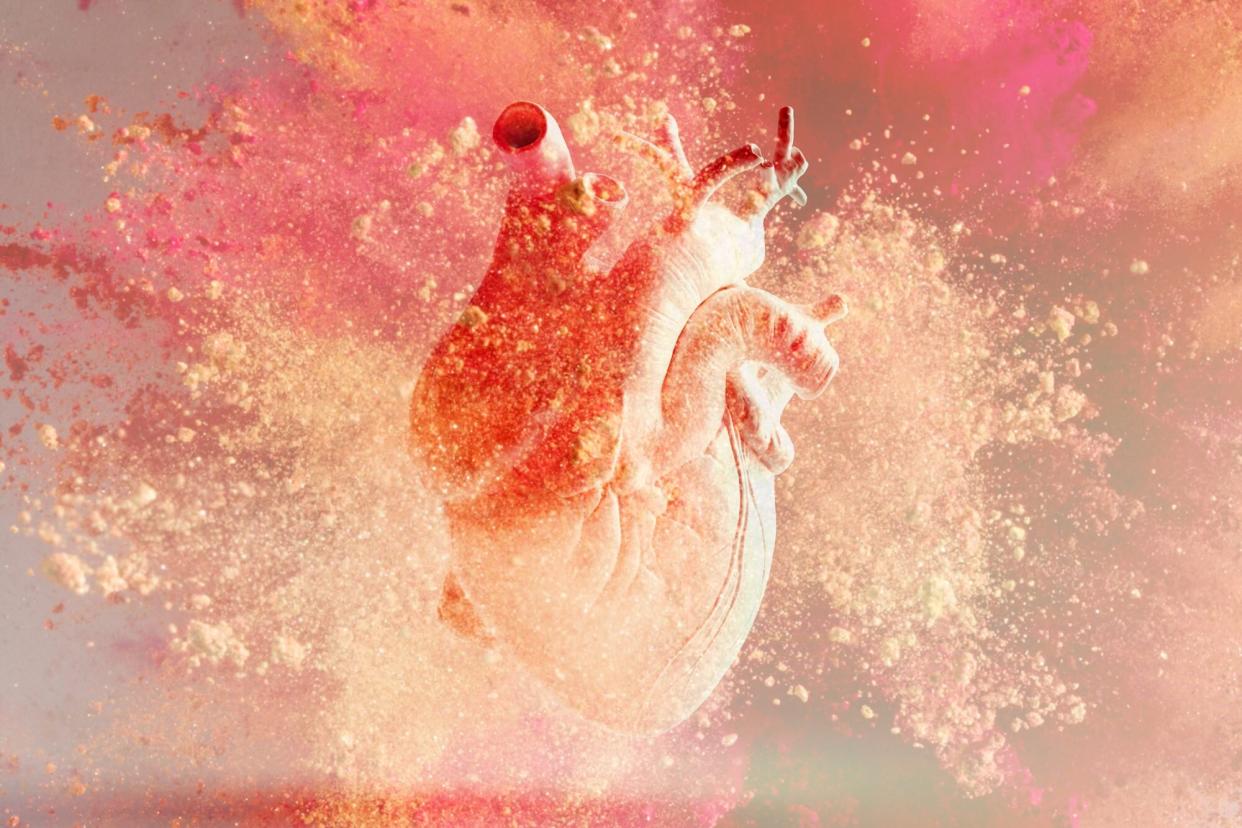"Broken Heart Syndrome" Is Surging Among Women — And It's Way More Serious Than It Sounds

Getty Images/InStyle
It's year three of the pandemic, so you probably already know Covid-19 can cause all kinds of serious problems beyond the initial infection, from dangerous organ inflammation to long Covid. And as we've all realized and probably even experienced by now, the stress of merely existing in a global pandemic can have long-lasting effects. For many women, that stress can be life-threatening.
Researchers at Cedars-Sinai in Los Angeles, Johns Hopkins, and Cleveland Clinic have found "broken heart syndrome" — a serious heart condition brought on by emotional stress — has surged during the pandemic. Data's still being gathered, but one study from Cleveland Clinic found rates have increased from less than 2% to almost 8% during the pandemic. The condition's especially common among women, both in general and during the pandemic, so it's important to understand the risk factors.
RELATED: The Stress Response That's Putting Women Last
Here's what you need to know about "broken heart syndrome" and how it affects women.
First, what exactly is "broken heart syndrome"?
The name makes it sound kind of trivial, but that couldn't be farther from the truth. "Broken heart syndrome", medically known as stress cardiomyopathy, is a kind of heart attack. Like any other heart attack, it can cause symptoms like shortness of breath, chest pain, and abnormal heart rhythms — but the mechanisms are totally different.
Typical heart attacks happen due to a blockage in a heart artery that damages the heart muscle, says cardiologist Sharonne N. Hayes, M.D., founder of the Women's Heart Clinic in Rochester, MN. Stress cardiomyopathy, on the other hand, doesn't involve blocked arteries. It can be life-threatening, but because it's easier for the heart to recover, Dr. Hayes says it's more survivable than other types of heart attacks.
Cases might be surging now, but it's not new. According to Dr. Hayes, the syndrome was first described in 1990. The Japanese researchers that identified it dubbed the syndrome "Takotsubo," because the shape of the left ventricle on an angiogram looks like the same-named ceramic pot used to capture octopuses in the ocean. As the syndrome gained more recognition and it became clearer emotional stress commonly caused it, Dr. Hayes said people started calling it "broken heart syndrome."
What's actually causing stress-induced heart attacks isn't totally clear. Stress affects the body in lots of ways. For example, you might get a tension headache after a long day or, if you're under long-term stress, you're more likely to develop high blood pressure or even problems with your arteries. One unproven hypothesis about stress cardiomyopathy, Dr. Hayes says, is that stress hormones can cause blood vessels in the heart to spasm. "They're not permanently blocked, but they can restrict blood flow and cause the heart muscle to be injured," she says.
Dr. Hayes isn't surprised by the pandemic spike, by the way. Heart attacks of all kinds tend to increase as a result of a major stressful event, like say after 9/11 or a natural disaster (though the data doesn't separate stress cardiomyopathy from other heart attacks), she explains.
And a 'broken heart', or emotional stress, isn't the only cause. Physical stress can contribute, too — for example, Dr. Hayes says it's not uncommon for people with other major illnesses to have this kind of heart attack. So while pandemic stress is almost certainly contributing to the numbers, the surge could also be connected to Covid-19 infection itself, or due to people delaying their care for other medical issues during the pandemic, she explains.
RELATED: Breast Cancer Is Still Going Undiagnosed Because of the Pandemic
The problem with calling it "broken heart syndrome" — and the risk factors you need to know about.
A stress-induced heart attack can happen to anyone, but according to the American College of Cardiology, postmenopausal women make up 90% of stress cardiomyopathy cases. "We don't want to call out women, but if a woman of that age comes in with those symptoms, a clinician's ears should perk up," Dr. Hayes says.
That said, she agrees calling a potentially deadly condition "broken heart syndrome" trivializes the risk (which is why she uses the medical term and usually refers to the nickname in quotes). The term also plays on healthcare inequities that women, especially women of color, face every day. Doctors are more likely to dismiss women's chest pain or shortness of breath as psychosomatic, and anxiety can cause those things. Cardiomyopathy, on the other hand, is an actual medical emergency caused by stress.
But Dr. Hayes emphasizes it's not that women are "just more emotional." "Physiologically, a woman's response to stress is different than a man's," she says. For example, research shows that under mental stress, men and women can experience totally different changes in blood pressure and blood flow, which might account for the disproportionate rates of stress cardiomyopathy among women.
Some women with stress cardiomyopathy also have other risk factors for heart attack, like high blood pressure, but according to the American Heart Association, traditional heart attack risk factors don't apply. So while it's easier said than done when you're living through a pandemic and systemic gender inequity, Dr. Hayes says one of the most important ways to prevent it is to manage your stress.
"For me to suggest a woman's untreated anxiety or depression needs to be managed could sound like I think it's all in their head," says Dr. Hayes. "How I couch it is, there's a very strong mind-heart connection. If we don't deal with our stress and worry, we can't heal our hearts."

